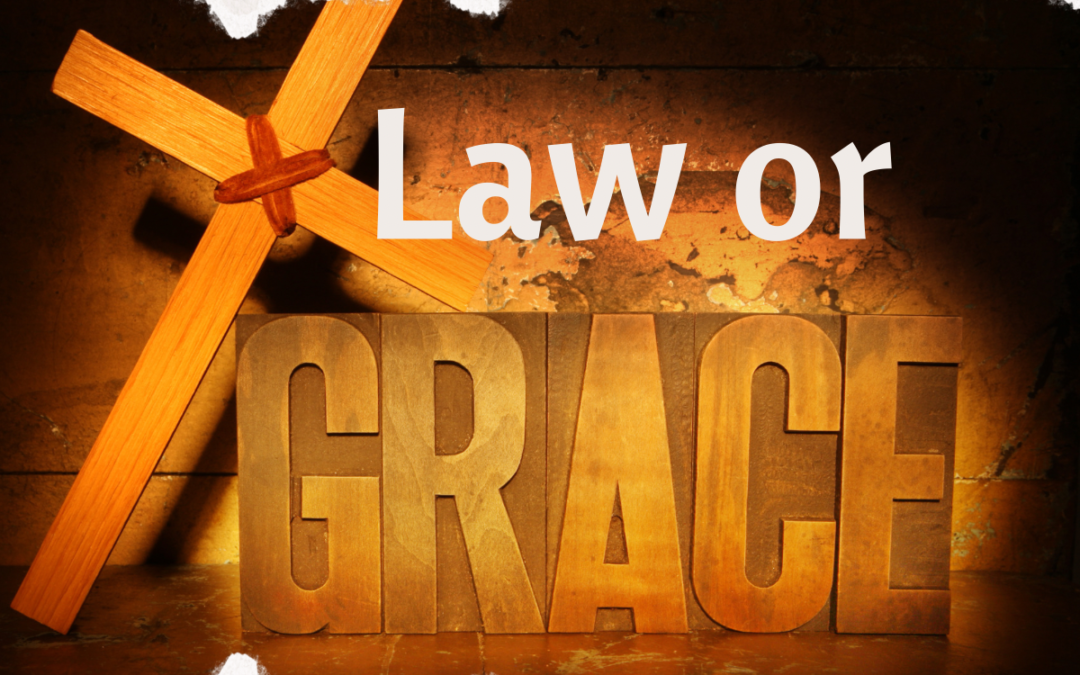Law or Grace
Is this (a) the Law of Moses or (b) the Grace of Jesus Christ – Law or Grace?
Introduction
The majority of Christians do not even consider the question above when they are hearing or reading the Word of God. Instead they just read on merrily. Do they have the ability to rightly divide between law and grace? I’ll leave that question for you to answer. This writing however is to ensure that you the reader has that ability. So let’s see what the Word has to say about this topic.
Gentile Christians
In the book of Romans the Apostle Paul’s audience are all born-again Christians (note in Chapter 1 Paul addresses his audience as saints. Saints are not dead people. They are born-again Christians). These Christians are predominantly Gentiles. However, we soon read that his audience had unwittingly placed themselves under the Law of Moses being encouraged to do so by the Judaizers.
Acts 21:20 KJV
…Thou seest, brother, how many thousands of Jews there are which believe; and they are all zealous of the law:
Judaizers
These Judaizers are also Christians (mostly former Jews) who teach new converts to Christianity that they too must now keep the law. Back in the first century AD the Judaizers emphasis was on circumcision but today it’s far more subtle. Yes the Judaizers are alive and just as active today as they were back then. Their teachings today, in some (but not all) Churches, are deceptive. They stealthily imply that if you “do this or do that”, God is more likely to hear you and therefore more likely to answer your prayers which is wrong teaching. It’s not said directly but it’s implied in such a way that everyone gets their message. This deceptive teaching by implication is rife today! Teaching us today to “Do this or do that in order to receive from God” is the law (not grace).

Judgment
In Rom 2:3 the apostle Paul continues to hammer home, judgment under the law, to his audience, which, if you are not under the law does not apply to you. The Law of Moses was only ever given to the children of Israel. It was never ever given to gentiles! Yet, here we find gentiles immersed in the Law of Moses. Is this happening in the Church today? Yes it is but let me not get side tracked in this writing. If you’ve got questions then contact me or make comments below.
Romans 3:19-20 KJV
Now we know that what things soever the law saith, it saith to them who are under the law: that every mouth may be stopped, and all the world may become guilty before God. [20] Therefore by the deeds of the law there shall no flesh be justified in his sight: for by the law is the knowledge of sin.
Romans 7:1 KJV
Know ye not, brethren, (for I speak to them that know the law) how that the law hath dominion over a man as long as he liveth?
Rightly dividing the New Testament
Rightly dividing the New Testament (including the ministry of Jesus) means firstly asking the question: Is this (a) the Law of Moses or (b) the Grace of Jesus Christ — Law or Grace?
Q. Why so?
A. Because Jesus was fulfilling the law during His ministry while at the same time He was ushering in Grace. Many times He had to answer as One under the law. Therefore He could not deny the law. As he explained, “For assuredly, I say to you, till heaven and earth pass away, one jot or one tittle will by no means pass from the law till all is fulfilled” (Matt 5:18).
Using the law lawfully
Furthermore, in the first five chapters of Romans Paul uses the law lawfully (1Tim 1:8) on his self-righteous audience and that’s what we see here in Rom 2:3. Basically these early chapters of Romans contain the Law on steroids! You see these people (Paul’s audience in Romans) actually enjoy being under the law (Luke 5:39) so Paul gives them what they apparently like and want – you want the law then cop this – I’m using poetic license in this sentence as I read between the lines I can see Paul’s logic.

Condemnation of the law
We can hear preaching from the first five chapters of Romans and come under condemnation of the law unless we know that it doesn’t apply to us who are not under the law. The Christian who’s not aware of this will think to themselves, well this is Romans, it’s new testament, therefore it must apply to me and of course that’s wrong thinking and wrong logic because it’s based on wrong information which will result in them embracing that condemnation which is only the start of them plunging deeper into the law through ignorance. Well as Paul said many times, “I would not have you ignorant…”.
Look at who Paul is talking to here in Romans – a specific group (Rom 7:1) – those who are under the law or any part of it.
Judgement
Sin will be judged and righteousness rewarded (Rom 2:5-10). What people have done with the Gospel is the focus of judgement (Andrew Wommack).
Remember, righteousness is a gift that we receive at the new birth. From the new birth forward we are the righteousness of God in Christ Jesus (2 Corinthians 5:21). Amen.
Set in Concrete
The Bible says that the strength of sin is the law (1 Cor 15:56). So everyone under the law (or any part of it) will be doing this. Doing what? – judging others while doing the very same thing themselves (Romans 2:1). You cannot be under the law and not do this. Why? Because the law is spiritual (Romans 7:14). The legal aspect of this (being under the hierarchy of Kingdom Law) is explained in the next paragraph of this writing but in a nutshell, what God placed in spiritual law is set in concrete. The Law of Moses has consequences that overwrite the good moral character of every person who places themselves under the law. The Word is telling us that this is regardless of how high that person’s moral character may be, it applies to e very single person who’s under the law. Once we get our head around this fact we need to read Romans Chapter 7 again (in full) and the lights will come on for us like never before!
The law is spiritual (Romans 7:14)
Q. So what does this mean … the law is spiritual (Romans 7:14)?
A. We know that the law (including the ten commandments) was a list of rules and regulations that were to be fulfilled in this earthly carnal realm (not in the spirit realm). However God placed the law of Moses in the spirit realm under the hierarchy of Kingdom law with consequences (both good and bad) that applied to those attempting to keep the law in proportion to how well or poorly they kept the law.
“The strength of sin is the law” (1 Cor 15:56). This is a legal statement (of the spirit realm) that applies to every person (both then and now) who put so much as their big toe under the law of Moses in the natural realm. There’s no escaping this for anyone who is under the law. The Bible declares it this way:

The offence [sin] might abound
Romans 5:20 KJV Moreover the law entered, that the offence might abound…
Abound means to run rampant!
Merriam-Websters Dictionary “abound — to be present in large numbers or great quantity: to be prevalent”.
Romans 3:20 KJV
…for by the law is the knowledge of sin.
Does this apply to me?
Romans 2:1-3 KJV Therefore thou art inexcusable, O man, whosoever thou art that judgest: for wherein thou judgest another, thou condemnest thyself; for thou that judgest doest the same things. [2] But we are sure that the judgment of God is according to truth against them which commit such things. [3] And thinkest thou this, O man, that judgest them which do such things, and doest the same, that thou shalt escape the judgment of God?
Q. Does this (Romans 2:3) apply to me?
A. Are you under the Law or Grace — Yes it does apply to you if you’re under the Law but No it does not apply to you if you’re under Grace.
Paul’s methodology for ministry
Paul’s methodology for ministry (1 Cor 9:19-23) …in summary: “I have become all things to all men”. In Rom Ch7 (see the verses copied immediately below in this writing) while pointing the finger at himself, Paul explains what happens to every person who comes under the law. Paul was not lying when he said these things as at a time past he’d been where his audience were presently at.
Romans 7:12-13,15 KJVS
[12] Wherefore the law is holy, and the commandment holy, and just, and good. [13] Was then that which is good made death unto me? God forbid. But sin, that it might appear sin, working death in me by that which is good; that sin by the commandment might become exceeding sinful. [15] For that which I do I allow not: for what I would, that do I not; but what I hate, that do I.
Q. And why do they do what they are preaching against?
A. …the strength of sin is the Law (1Cor 15:56).
Verse 13 (of Ch2) shows that Paul in Chapter 2 was reinforcing the teachings of the law.
Yet Jesus was/is the end of the law unto righteousness (Rom 10:4).
Q. So why is Paul still preaching the Law?
A. Because he’s positioning himself to take his audience from where they are presently at (which is under the law of Moses) to the Grace of Jesus Christ.
Note Paul asks the question “thinkest though this? (Rom 2:3)”. Hearing this, these people would immediately come under the condemnation of the law (2Cor 3:9) as this (what he was about to state) was applicable under the law. This is what the Bible calls using the Law lawfully. Of course this does not apply to those Christians who are under grace and not under a blend of grace and law.
Paul’s preparing his audience for the preaching of ‘the Grace of God’ which is received through faith, in Rom Ch 10.

So did the Law just end?
Q. So did the Law just end?
A. It ended for those who believed. See and ponder the qualifications of Romans 10:4. The law had a use by date but people today are still feeding on the law well past it’s use by date. The Bible says: The law was until John (Luke 16:16) and the law was until the seed (Jesus) should come (Gal 3:19).
Romans 10:4 KJV
For Christ is the end of the law for righteousness to every one that believeth.
Delivered from the Law
Paul goes on to teach in Rom Ch 7 that those who were (at a time past) under the law and have now believed on Jesus, they are now ‘in Christ’ having been delivered from the law (Rom 7:6 & Rom 7:24-25).
“In Christ” means born again Christians. Individuals who have met the criteria set out in Romans 10:9-10 and have been delivered from …
Has translated (delivered) us into the kingdom of his dear Son (Col 1:13-14)
If you are born-again then you have been delivered and this is the only deliverance you need.
Colossians 1:12-14 KJV
Giving thanks unto the Father, which hath made us meet to be partakers of the inheritance of the saints in light: [13] Who hath delivered us from the power of darkness, and hath translated us into the kingdom of his dear Son: [14] In whom we have redemption through his blood, even the forgiveness of sins:
Romans 7:4 KJV
Wherefore, my brethren, ye also are become dead to the law by the body of Christ; that ye should be married to another, even to him who is raised from the dead, that we should bring forth fruit unto God.

The New Covenant
Hebrews 8:6-10 KJV But now hath he obtained a more excellent ministry, by how much also he is the mediator of a better covenant, which was established upon better promises. [7] For if that first covenant had been faultless, then should no place have been sought for the second. [8] For finding fault with them, he saith, Behold, the days come, saith the Lord, when I will make a new covenant with the house of Israel and with the house of Judah: [9] Not according to the covenant that I made with their fathers in the day when I took them by the hand to lead them out of the land of Egypt; because they continued not in my covenant, and I regarded them not, saith the Lord. [10] For this is the covenant that I will make with the house of Israel after those days, saith the Lord; I will put my laws into their mind, and write them in their hearts: and I will be to them a God, and they shall be to me a people:
Q. Who is He making a new covenant with?
A. I will make a new covenant with the house of Israel and with the house of Judah
There can only be a new covenant to those who have been under an old covenant.
Q. So what about us gentiles who have never been under the law of Moses?
A. We were grafted into the everlasting covenant of Grace which God made with Himself in the beginning (not the beginning of time, but in the beginning when God knew us before creation). God said continually My covenant I will establish with Abraham, Noah and many others. The covenant of Grace is a single everlasting covenant established with many men of old. It is the covenant that we born-again gentile Christians were grafted into by faith in Jesus. Though both covenants are blood covenants only the covenant of Grace is an everlasting covenant. So again Paul poses the question: Which covenant do you choose to live under?
Hebrews 8:13 KJV
In that he saith, A new covenant, he hath made the first old. Now that which decayeth and waxeth old is ready to vanish away.
Q. New to who?
A. …the house of Israel and with the house of Judah.
Which covenant do you choose to live under?
The New Testament is the fulfilment of the Abrahamic covenant or you could say, the fulfilment of the covenant of Grace. Those who were under the old covenant (the Mosaic law) were given a new covenant. We gentiles however were grafted into the Abrahamic covenant …the everlasting covenant of grace.
Garry Preston

